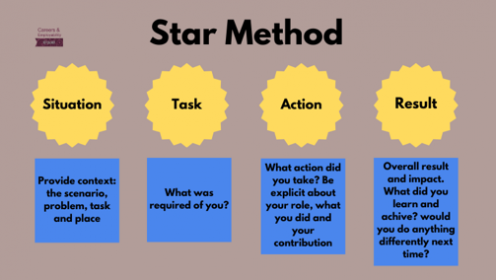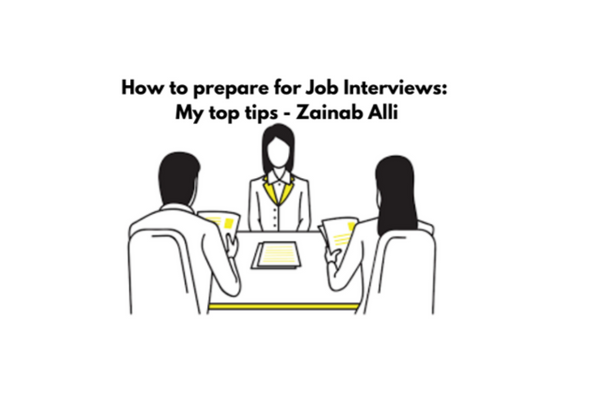Research the company, the role, and your interviewers!
Company: Before the interview, I found it extremely beneficial to research the organisation and their website to demonstrate that I was a good fit for the organisation, and they are an equally good fit for me. Glassdoor and LinkedIn are fantastic platforms I used for learning more about an organisation, including reviews, salaries, and the most common interview questions asked.
Role: When applying for jobs, you may come across the terms essential and desirable in the job description and person specification.
- Essential criteria are qualifications, experience, skills or knowledge required to apply for a role. For example, having an education to a degree level or excellent communication and teamwork skills.
- Desirable criteria are the skills and experience that an employer prefers. For example, experience working in higher education or a specific qualification. If the organisation receives many applications, this may be used to decide who to invite to an interview.
Reading through the job description and person specification (where they list essential and desirable criteria) helped me analyse what my potential employer is seeking. Using LinkedIn is helpful to search for people with similar job titles at the same organisation. Explore their profiles to see how they describe their role, and to understand their backgrounds and skill sets.
Interviews: Prior to the interview, I asked who my interviewers were, researched their role, job experience, and journey. This type of information helps to better understand how to connect with them, puts you ahead of other candidates, allowing the interview to feel more like a conversation.
Tailor your answers to the job
Reading the job description and person specification (if there is one) helped me prepare an example for different competency and strength-based questions. A competency-based question are questions used to determine how you handled tasks, challenges, and other aspects of your previous or current job. For example, when have you
- completed a difficult task as part of a team? Or describe how you have positively contributed to a team?
- A strength-based question are questions on the abilities and interests of the candidate. For example, what interested you about this position and our company? Or where do you see yourself five years from now?

I then analysed these criteria’s and categorised them into key themes. Using the STAR method, I planned my answers to interview questions. This shows you have the competency, experience, skills, and attitude to fulfil the role. You can use the STAR method to highlight skills and qualities you have that the employer is looking for. Aim to have at least two STAR examples to showcase your strengths under these themes. These STAR examples can be used for more than one theme.
When using STAR, remember:
- you can use examples from work, home or volunteering.
- keep examples short and to the point.
- try to get your points across in a conversational way so it does not to appear too rehearsed.
- be prepared to answer follow-up questions about the examples you give.
Here is an example of a STAR method:
Tell me about a time when you solved a problem?
Situation: As a FANS (Friend of Arriving New Students) during the 2019/20 academic session.
Task: I was due to deliver a FANS welcome session, however, when I turned up to the assigned room five minutes before delivery time, I discovered there was a double booking of another FANS session in there.
Action: I acted quickly by informing the FANS Co-ordinator. However, due to her being otherwise engaged in a meeting, I found out that I had to contact the University’s timetabling team. I called them and explained the situation requesting they assign me an empty room immediately. I acted quickly, remained calm and a solution was found with minimal negative impact.
Result: It took around 15 minutes of the scheduled presentation time, however, due to the session being an hour long, I was able to make up the lost time. If it had been a short session, I would have apologised to the students and promised to rearrange at a convenient time. I also learned that it always pays off to be at a required place a good 15-20 minutes beforehand to allow for such issues and to be able to find solutions more easily with more time.
Demonstrate your skills with evidence!
Prepare questions!
Ahead of my interview, I brainstormed at least five questions to ask the interviewers about the role and organisation. This is a valuable opportunity for you to demonstrate your interest in the role and to clarify any queries you may have. For example, some of the questions I asked included opportunities for training and progression and challenges within the role.
Practice, Practice and Practice!
Rehearse your answer to ace your interview! Shortlist.Me is an excellent platform I used for interview preparation. Don’t forget you can always book a 1:1 career consultation to practice with a career advisor.
***
Many thanks to Zainab, our graduate intern for the Early Graduate Support project, for this excellent blog.
For any careers support, please reach out to us via the channels below.
E: careers@westminster.ac.uk| Website | Facebook | Twitter | Instagram |Careers Blog
- An End-to-End Guide to Applying for Jobs: Where and When to Start! - 22 December 2025
- Graduate Success Series: a conversation with Ying Zhang - 18 December 2025
- Why Purpose is Your Greatest Asset in Higher Education - 23 October 2025
